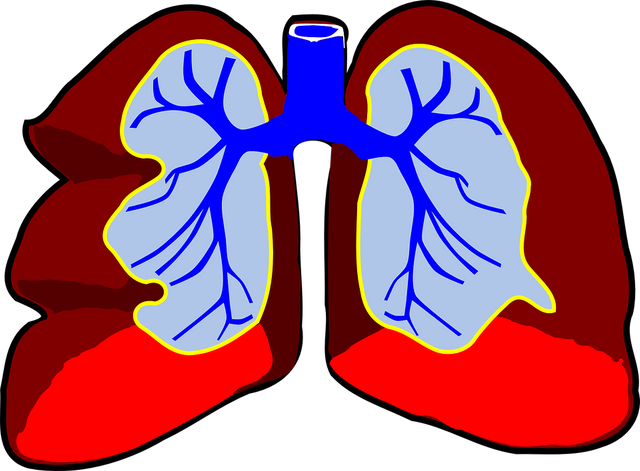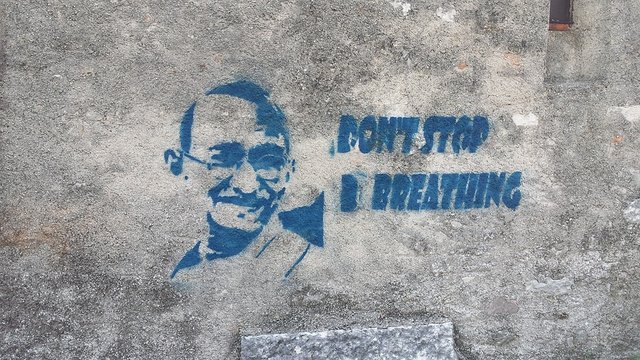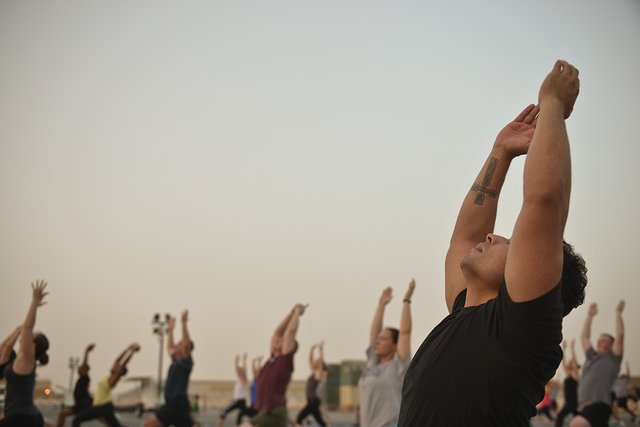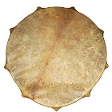Shaman Knowledge: Long breath / Schamanenwissen: Langer Atem
English - German

Introduction
From the variety of breathing techniques I have chosen today a very simple form which I will introduce in this article. Our normal breathing cycle takes about 3 seconds, as you can easily see for yourself. About 0.5 - 0.7 liters of air are inhaled and exhaled. The lung is our largest organ and can be extended to 5 liters volume.
Through constant practice, our lung capacity can be expanded quite quickly. The normal superficial and irregular breathing leads to an emotional attitude to life, to tension and weak nerves. The technique of "long breath" can be applied by anyone without difficulty.

Technique
The long breath is carried out in 6 steps:
- Inhaling in the abdomen
- Inhaling in the chest area
- Inhaling in the shoulder area
- And back
First step
In a comfortable posture, we relax the stomach and allow the air to flow into it effortlessly. The stomach is moved slowly forward. A simple help is to place one hand in the middle of the navel and watch it go forward while inhaling.
Second step
Now we begin to widen the ribs and chest and fill the middle part of the lung with air. The belly stays in the relaxed position in front.
Third step
Finally, we lift the clavicles slightly so that the shoulders and sternum rise. As an aid, the arms can be stretched up to aid this movement.
Fourth step
Now we breathe out in reverse order. First lower the shoulders and sternum to exhale the air from the upper part of the lungs.
Fifth step
Then follow the ribs, which lower again to empty the middle area of the lung.
Sixth step
And finally, we put the stomach in as far as possible, squeezing the last remaining air out of the lungs.

Execution
We distinguish between practicing and breathing. When practicing, we train the steps, so that the large number of muscles involved get used bit by bit to the new task. Take your time and try with short pauses between the steps to focus your entire attention on the correct execution.
As soon as the processes have become completely clear, the "long breath" can be started. The individual steps should still not be mixed, consider them as a big wave. This technique has no breathing pauses, so the breath flows in and out continuously.
Conclusion
Already after the first full breath you will notice a deep relaxation and a feeling of peace. After some time of breathing, patience and stamina will be combined with a greater awareness.
As soon as the respiratory rate is expanded to more than 8 seconds, the hormone balance in the body begins to regulate. At over 15 seconds, we enter the state of deep meditation. Other effects include: emotional stability, anxiety and insecurity disappear, inner peace spreads, addictive behavior can be reduced or completely eliminated. Negative effects of this technique are not known, I wish you much success with it!

Einleitung
Aus der Vielzahl von Atemtechniken habe ich heute eine sehr einfache Form ausgesucht die ich in diesem Artikel vorstellen werde. Unser normaler Atemzyklus dauert etwa 3 Sekunden, wie du leicht selber feststellen kannst. Dabei werden etwa 0,5 - 0,7 Liter Luft ein- und ausgeatmet. Die Lunge ist unser größtes Organ und kann bis auf 5 Liter Volumen erweitert werden.
Durch beständiges Üben kann unsere Lungenkapazität recht schnell erweitert werden. Die normale oberflächliche und unregelmäßige Atmung führt zu einer emotionalen Lebenseinstellung, zu Verspannungen und schwachen Nerven. Die Technik des "Langen Atems" kann von jedem ohne Schwierigkeiten angewendet werden.

Technik
Der lange Atem wird in 6 Schritten ausgeführt:
- Einatmen in den Bauch
- Einatmen in den Brustbereich
- Einatmen in den Schulterbereich
- Und zurück
Erster Schritt
In bequemer Haltung entspannen wir den Bauch und lassen die Luft ganz ohne Anstrengung dort hineinfließen. Dabei wird der Bauch ruhig und langsam nach vorne bewegt. Eine einfache Hilfe ist eine Hand mittig auf den Nabel zu legen und zu beobachten wie sie beim Einatmen nach vorne geht.
Zweiter Schritt
Nun beginnen wir die Rippen und den Brustkorb zu weiten und füllen den mittleren Teil der Lunge mit Luft. Der Bauch bleibt in der entspannten Lage vorne.
Dritter Schritt
Als letztes heben wir die Schlüsselbeine etwas an, so dass sich die Schultern und das Brustbein hebt. Als Hilfe können die Arme nach oben gestreckt werden um diese Bewegung zu unterstützen.
Vierter Schritt
Nun atmen wir in umgekehrter Reihenfolge wieder aus. Zuerst Schultern und Brustbein senken um die Luft aus dem oberen Bereich der Lunge auszuatmen.
Fünfter Schritt
Dann folgen die Rippen, die sich wieder senken, um den mittleren Bereich der Lunge zu entleeren.
Sechster Schritt
Und schließlich ziehen wir den Bauch so weit als möglich ein und pressen so die letzte verbliebene Luft aus der Lunge heraus.

Ausführung
Wir unterscheiden zwischen Üben und Atmen. Beim Üben trainieren wir die einzelnen Schritte um die Vielzahl der beteiligten Muskeln Stück für Stück an die neue Aufgabe zu gewöhnen. Lasse dir dabei Zeit und versuche mit kurzen Pausen zwischen den einzelnen Schritten deine ganze Aufmerksamkeit auf die korrekte Ausführung zu richten.
Sobald die Abläufe vollkommen klar geworden sind kann mit dem "Langen Atem" begonnen werden. Die einzelnen Schritte sollten weiterhin nicht vermischt werden, betrachte sie als eine große Welle. Diese Technik hat keine Atempausen, der Atem fließt also kontinuierlich ein und aus.
Fazit
Bereits nach dem ersten kompletten Atemzug wirst du eine tiefe Entspannung und das Gefühl von Frieden bemerken. Nach einiger Zeit des Atmens wird sich Geduld und Ausdauer verbunden mit einer größeren Bewußtheit entwickeln.
Sobald die Atemfrequenz auf über 8 Sekunden ausgedehnt wird beginnt sich der Hormonhaushalt im Körper zu regulieren. Bei über 15 Sekunden treten wir in den Zustand der tiefen Meditation ein. Weitere Auswirkungen sind: emotionale Stabilität, Angst und Unsicherheit verschwinden, innere Ruhe breitet sich aus, Suchtverhalten kann vermindert oder ganz eliminiert werden. Negative Auswirkungen dieser Technik sind nicht bekannt, ich wünsche viel Erfolg damit!
(Images CC0)

See you next time! / Bis nächstes Mal!
Thank you for your attention! / Danke für Deine Aufmerksamkeit!
Original content by
 Schaman Gerbert
Schaman Gerbert
This is a very good practice. I would say the final step is most important, as the full exhalation forces all the stale air out of the body.
Yes, it is important to get rid of the toxic elements.
Sehr gut! Danke habs eben ausprobiert und bin (fast) auf 8 Sekunden gekommen:-D
Ja, das sollte überhaupt kein Problem sein.
Die Kunst besteht darin es über längere Zeit aufrecht zuerhalten.
Thank you for a reminder to breath @schamangerbert Taking a breath in the first thing we do when we are born, we all know how to breath, yet we are never taught how to breath. Breath can be both involuntary (controlled purely by the body) and voluntary (controlled by the mind). We almost always rely on automatic pilot for breathing. Making it a conscious process makes a huge difference in our ability to be conscious about other processes in and around us. It is such a simple tool, perhaps that is why we overlook it.
3 controlled breathing a day change the live!
Hello friend, certainly this technique is the right way to breathe, so we should breathe constantly. When we are babies, we breathe correctly but once we grow up we forget how to do it properly. And breathing is so important that breathing well not only produces pas but also produces balance, healing, well-being, helps control nerves, crises and many other things. According to my way of seeing it, adequate breathing intervenes in the development of people and can contribute to a better life and a better world. Thanks for this information friend, greetings.
Yes, breathing is one of the main things I look to people at first, changing the breathing is often the first step to health.
Hallo nach langer Zeit :-) sehr interessant. Didgeridoo spielen erweitert die Lunge auch noch. Das mit dem Suchtverhalten ist zudem sehr spannend.
Wenn man diese Übung macht hat man ja gar keine Zeit um Süchten nachzugehen :)
Oh okay... so I should try this one time... Soon. :D
I guess I should try deep breathing more then.
What you should do or not I can not say, but you may try it :)
Ist schon beeindruckend was man alles mit der Atmung beeinflussen kann!
Wäre mal einen Versuch wert es zu versuchen :)
Thank you! You are getting deeper into your shaman mode! This is very nice! The breathing technique is a bit like Thai Samatha meditation.
I would like to know if you ever experience the feeling of almost not-breathing in your deep meditation!? The breathe seems to disappear on one of the breathes.
Cheers.
Soon I will make a post about pranayama and some secrets in it then you get the answer :)
Thank you very much! Waiting for your new posts!
its a very informative post ......for our daily life..............this time you made a great mode of shaman.............you are so experienced about this.....so obviously i agree with you.......keep touch with us......best of luck
Hahahaaha i mixed up the steps captain... i should practice it more.... this is a good exercise for me since our family has asthma history... 😁😁😁
It is an easy technique if you know it very well, but the way to know it is not a short one :)
For asthma I make a different post sooner or later. But playing didgeridoo is well known to help a lot.
Ohhh thank you captain I'll wait for your asthma breathing post... 😊😘